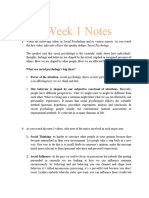0% found this document useful (0 votes)
13 views5 pagesSocial Assignment
The document provides an overview of social psychology, defining it as the scientific study of individual behavior, feelings, and thoughts in social contexts. It discusses the nature of social psychology, its methods, and its relationship with other disciplines like sociology and anthropology. Key assumptions include the influence of both personal and situational factors on behavior, the role of socially constructed realities, and the importance of scientific methods in understanding social behavior.
Uploaded by
srishtisharmak009Copyright
© © All Rights Reserved
We take content rights seriously. If you suspect this is your content, claim it here.
Available Formats
Download as PDF, TXT or read online on Scribd
0% found this document useful (0 votes)
13 views5 pagesSocial Assignment
The document provides an overview of social psychology, defining it as the scientific study of individual behavior, feelings, and thoughts in social contexts. It discusses the nature of social psychology, its methods, and its relationship with other disciplines like sociology and anthropology. Key assumptions include the influence of both personal and situational factors on behavior, the role of socially constructed realities, and the importance of scientific methods in understanding social behavior.
Uploaded by
srishtisharmak009Copyright
© © All Rights Reserved
We take content rights seriously. If you suspect this is your content, claim it here.
Available Formats
Download as PDF, TXT or read online on Scribd
/ 5






















































































